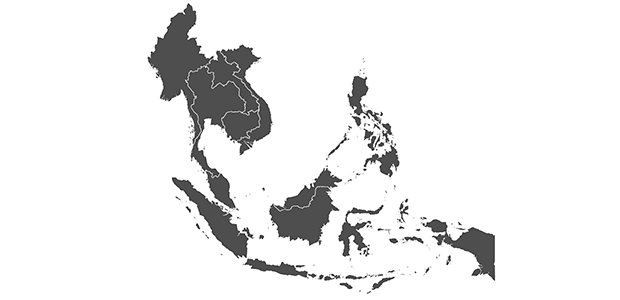
Beyond the Big Four: Why Southeast Asia is Next Expansion Frontier for European SMEs
For decades, European companies have primarily focused on the "Big Four" – China, India, Japan, and South Korea – for their Asian expansion strategies. While these established markets offer undeniable economic power, recent developments have led European businesses to look beyond traditional targets.
The slowdown and geopolitical tensions with China have prompted many companies to diversify their operations and de-risk their investments. This shift has opened doors for Southeast Asia, a region experiencing remarkable economic growth and a surge in foreign direct investment (FDI). Countries like Vietnam, Indonesia, Thailand, and the Philippines are rapidly transforming, boasting young and tech-savvy populations, rising disposable incomes, and supportive government policies.
This article delves into the exciting potential of these "rising stars" within Southeast Asia, highlighting their unique advantages for European companies seeking new frontiers.
Southeast Asia: A Breeding Ground for Investment Opportunities
Moving beyond the well-trodden paths, let's delve deeper into specific markets within Southeast Asia that hold immense promise:
- Vietnam: A rising star with a young population exceeding 98 million, a rapidly growing middle class, and a projected GDP growth of 6.7% in 2024 (World Bank, 2023). This demographic translates to a lucrative market for European companies in sectors like software development, e-commerce, and green technology. The government actively promotes foreign investment in these areas, with initiatives like the National Digital Transformation Program attracting European tech giants like Siemens and Bosch.
- Indonesia: The largest economy in Southeast Asia, boasting a population of over 270 million and a projected GDP growth averaging 4.9% over 2024-2026 (World Bank, 2023). The government actively promotes FDI, making it easier for European companies to establish and operate in this market. Additionally, Indonesia's strategic location within ASEAN makes it a gateway to the wider Southeast Asian market, offering significant logistical advantages. German engineering giant Bosch, for example, established a strong presence in Vietnam, leveraging its local talent pool and government incentives to become a leading manufacturer of automotive components.
- Thailand: A strategic hub for tourism and services, attracting millions of visitors annually. Its service sector accounts for over 57% of its GDP (Focus Economics, 2021). European companies offering hospitality, travel, and luxury goods can capitalize on Thailand's established tourism infrastructure and growing disposable incomes within the local population.
Why Southeast Asia Matters for European Companies
Southeast Asia beckons European investors with a compelling narrative beyond the mere economic indicators. While the numbers paint a promising picture, a closer look reveals a landscape brimming with unique advantages that can propel European companies towards sustainable growth.
One such advantage lies in the vast, untapped potential these markets offer. Unlike the saturated landscapes of the Big Four, Southeast Asia presents fertile ground for European companies to establish brand recognition and carve out significant market share. This first-mover advantage can be a game-changer, paving the way for long-term success.
Furthermore, the region boasts a burgeoning middle class with rising disposable incomes, fueling a growing demand for European products and services. This demand is particularly pronounced in sectors like healthcare, education, and sustainable consumer goods. By understanding these evolving consumer trends, European companies can tailor their offerings and marketing strategies for optimal results, ensuring they resonate with the local customer base.
Adding further allure, many Southeast Asian countries actively woo foreign investors with a plethora of attractive incentives. Tax breaks, streamlined regulations, and infrastructure development initiatives create a supportive environment that fosters long-term business sustainability. Vietnam's National Digital Transformation Program, actively attracting foreign investment in the tech sector, serves as a prime example of this supportive approach.
Navigating the Challenges
However, venturing into these markets also presents unique challenges that require careful consideration. Cultural nuances play a crucial role, and building trust and fostering successful partnerships hinges on understanding and adapting to diverse business practices and customs. A deep understanding of local communication styles and customs is vital for ensuring smooth operations and long-term success.
Navigating the evolving regulatory environments of these emerging economies presents another challenge. Partnering with experts who can provide guidance on navigating the complexities of local regulations and legal frameworks is crucial for ensuring compliance and avoiding unnecessary delays.
Finally, while infrastructure is rapidly improving in Southeast Asia, some areas may still face limitations in transportation, logistics, and digital connectivity. Careful planning and logistics strategies are necessary to overcome potential bottlenecks and ensure efficient operations.
Despite these challenges, the unique advantages offered by Southeast Asia make it a compelling frontier for European companies. By leveraging the vast potential, understanding evolving consumer trends, and navigating the challenges with the right support, European companies can establish themselves for long-term success in this dynamic and exciting region.
Strategies for Success
To navigate these challenges and maximize their potential in Southeast Asia, European companies should consider the following strategies:
- Product Adaptation: Tailoring product offerings and marketing strategies to local preferences and cultural nuances is crucial for resonating with the target audience.
- Talent Acquisition: Building a strong local talent acquisition strategy is essential to bridge cultural gaps and ensure a successful market entry. As experts in global employment solutions, AgileHRO can be a valuable partner in this process, helping European companies recruit top talent and navigate the complexities of relocation.
- Local Partnerships: Partnering with established local companies can provide valuable operational expertise, market access, and cultural insights.
Conclusion
Southeast Asia presents a compelling landscape for discerning European investors seeking to unlock untapped potential. By moving beyond the well-trodden paths and focusing on specific markets like Vietnam, Indonesia, and Thailand, European companies can leverage unique advantages, emerging consumer trends, and government support. AgileHRO, as a trusted partner, can provide invaluable support in navigating the challenges and facilitating a successful and sustainable expansion into Southeast Asia's exciting new frontier.

